Wanchalearm Satsaksit: The Thai satirist abducted in broad daylight
 Wanchalearm Satsaksit
Wanchalearm SatsaksitSitanan Satsaksit was on the phone to her brother early in the evening on 4 June when he told her to hold the line. Wanchalearm, also known as Tar, was handing over a few dollars for meatballs at a stall opposite his home in the Cambodian capital, Phnom Penh.
Then Sitanan heard noise coming from the other end of the line.
"I heard a loud bang. At first I thought he had a car accident as he shouted 'I can't breathe, I can't breathe,'" she tells the BBC.
Sitanan could hear the screams of her brother as men shouted in Khmer, a language she doesn't understand.
But her brother had not been hit by a car - he was being kidnapped.
Witnesses at the scene say they saw a group of armed men bundling Wanchalearm into a black SUV. As he shouted for help in Khmer, some people started moving towards him, but the armed abductors warned them to back off, before speeding away.
Confused and terrified, Sitanan could hear the muffled voice of her brother for another 30 minutes. Then the line went dead.
A friend of Wanchalearm made some inquiries for her.
"Twenty minutes later, this person called me back to say: 'Keep calm sister, Tar was abducted,'" she recalls.
Wanchalearm Satsaksit, 37, a prominent Thai pro-democracy activist who had lived in exile in Cambodia since 2014, has not been seen since. He is the ninth exiled critic of Thailand's military and monarchy to become a victim of enforced disappearance in recent years.
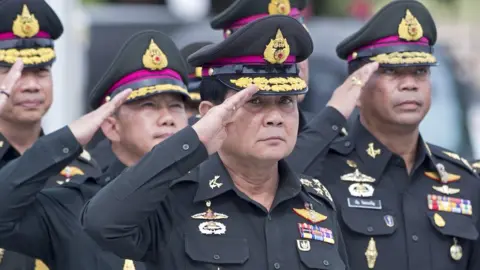 Getty Images
Getty ImagesA popular and colourful character, Wanchalearm's activism started more than a decade ago, primarily focusing on gender and LGBT rights in Thailand. Over time, his interest started to shift to broader calls for democracy in the country, says Sunai Phasuk, a senior researcher for Human Rights Watch Asia and friend of Wanchalearm.
By the time of the 2014 military coup led by General Prayuth Chan-ocha, Wanchalearm was affiliated with the United Front for Democracy Against Dictatorship (UDD), also known as the Red Shirts. The group was first formed in 2006 to oppose an earlier military coup which overthrew then prime minister, Thaksin Shinawatra.
Wanchalearm was angered by what he saw as yet another affront to democracy by the military in 2014. The new junta wasted little time in rooting out its critics.
Soon after the coup, Wanchalearm's face appeared on TV and he was called to attend a meeting at a military camp, Sunai says. He didn't turn up. Wanchalearm knew this meant he needed to flee his homeland and start a new life in Cambodia.
Once in Phnom Penh, Wanchalearm settled into his new surroundings. But while he had swapped the dangers of Thailand for relative safety in the leafy outskirts of the Cambodian capital, he was still building up an online following in his homeland through his witty takedowns of the Thai government.
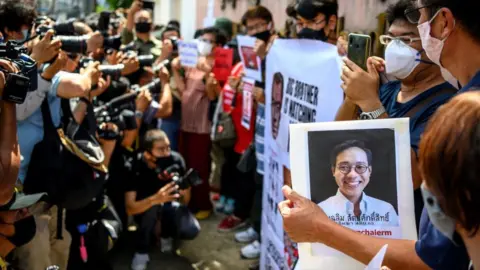 Getty Images
Getty Images"He sees himself as a satirist, almost like a political comedian," Sunai says. "He made fun continuously of the military junta. He made fun of Gen Prayuth, who at that time was leader of the coup group, he made fun of other generals.
"He exposed what he considered to be stupid blunders of the junta using the dialect of north-easterners," he adds. "Most of them are poor and he is from that region. He did it to show that a commoner can make fun of those in power. That seemed to be the way of getting even with the oppressors."
But his playful poking did not go unnoticed.
In June 2018, Thai authorities issued an arrest warrant for Wanchalearm based on allegations he violated the Computer-Related Crime Act - which criminalises writing that incites unrest - through his Facebook page. The police vowed to bring him back to Thailand.
Wanchalearm was just one of many Thai exiles speaking out from the perceived safety of a neighbouring country. But in reality, doing so is becoming increasingly perilous.
At least eight other pro-democracy activists have disappeared since the 2014 coup.
The bodies of exiled critics Chatcharn Buppawan and Kraidej Luelert were found disembowelled and stuffed with concrete along the Mekong River border with Laos last year. The Thai army says it had no knowledge of what had happened.
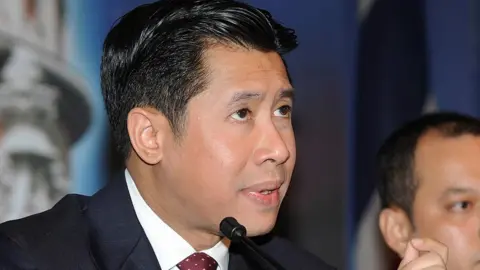 Getty Images
Getty ImagesJakrapob Penkair, who served as government spokesman under Thaksin Shinawatra, has been living in exile since 2009 after he says he received a tip-off that he was to be killed. He has known Wanchalearm for many years.
Speaking to the BBC from an undisclosed location, Jakrapob says he was shocked by his friend's disappearance due to the light-hearted nature of his activism. He sees almost no chance that Wanchalearm is still alive.
"I think the message is: 'Let's kill these folks. These are outsiders, these are people who are different from us and they should be killed in order to bring Thailand back to normalcy,'" he says.
"But nothing could be more wrong in that interpretation. I believe their decision to kidnap and murder Tar, and others before him, has been subconsciously radicalising the people.
"Like it or not, I think Tar's disappearance and his murder could be a turning point."
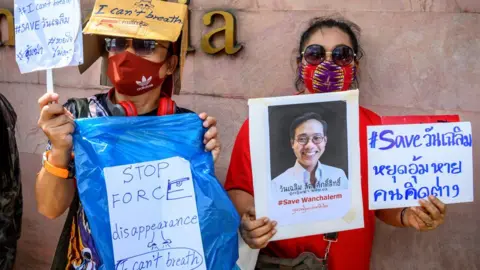 Getty Images
Getty ImagesWanchalearm's disappearance sparked protests in Bangkok, with demonstrators accusing the Thai government of involvement, while demanding the Cambodian government investigate the case fully. Posters of Wanchalearm and other disappeared activists have been cropping up around the city.
#SaveWanchalearm was trending on Thai Twitter in the days following his abduction.
The hashtag "#abolish112" was also written or retweeted more than 450,000 times. This is a reference to Article 112 of Thailand's criminal code, which states: "Whoever defames, insults or threatens the King, Queen, Heir-Apparent or Regent shall be punished with imprisonment of three to 15 years".
Some of the disappeared dissidents were accused of violating the article. Any public questioning of the monarchy in Thailand was until recently almost unheard of.
Many activists believe this abduction is linked to the palace, but the strict laws against any negative comment on the monarchy make this a dangerous link to explore or investigate.
Despite widespread outrage over the kidnapping of Wanchalearm, few are holding out much hope for his return.
"The abduction is not for money, it's not a private matter. There is no need to keep him alive," says Somyot Pruksakasemsuk, a prominent activist who served seven years in jail on charges of lese majeste - or "insulting the monarchy" - and defamation.
"The objective of kidnapping is to kill him and to create the atmosphere of fear in Thailand and other countries where [Thai] people are active in criticising the monarchy," adds Somyot, whose daughter was once in a long-term relationship with Wanchalearm.
Somyot was in little doubt as to who was behind the disappearance.
"The government knows very well about this kidnap and disappearance. I can insist that the government are the ones behind this violation," he says.
Thai government spokeswoman Narumon Pinyosinwat told the BBC: "We have no idea what happened to him.
"We don't do anything in that category of invading into other countries. They have their own law and control," she said.
"The person who can answer that question best should be the government of Cambodia because they know what happened in that country to this person."
In response to questions raised by opposition politicians in parliament, Thai Foreign Minister Don Pramudwinai said that Wanchalearm did not have political refugee status, so Thailand had to wait for Cambodia to finish its investigation.
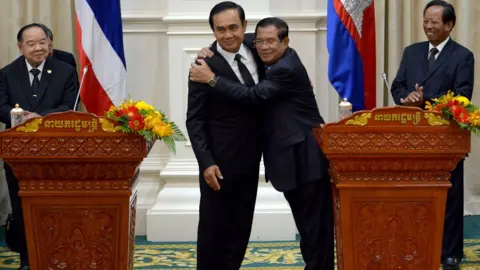 Getty Images
Getty ImagesThe spokesman of the Cambodian interior ministry did not respond to requests for comment. A justice ministry spokesman told Voice of Democracy last week that investigations are under way to ascertain "whether the news is true or not".
Brad Adams, Asia director of Human Rights Watch, said: "Cambodia and Laos have obviously decided to look the other way as now nine prominent Thai exiles have been abducted, and likely killed, by unknown men."
The Thai government is pursuing a "quid pro quo" with its two neighbours, he said, accusing Bangkok of making Thailand "off limits" to Cambodian opposition figures.
"You can be sure there will be more refugees on the chopping block unless governments around the world start publicly demanding answers and accountability from leaders of these three rights abusing governments," he said.
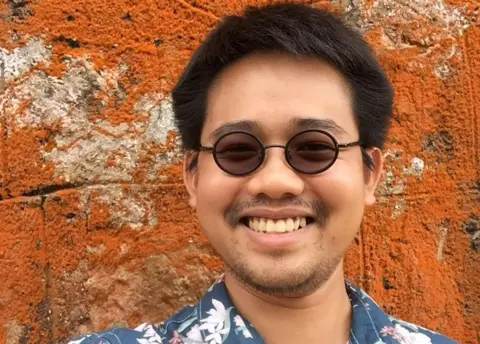 Wanchalearm Satsaksit
Wanchalearm SatsaksitSunai Phasuk says Cambodia must investigate fully what has happened to Wanchalearm if it expects to be seen as a country that has "improved from a lawless society into a country with due process".
"A crime like this cannot happen in broad daylight. This is a test case for Cambodia," he says.
But Sitanan has little hope of ever seeing Wanchalearm alive again and is just trying to make sense of why someone would want to kill her younger brother.
"I want to know if someone has his own opinion, does he need to be so severely punished?" she asks.
"He didn't rob anyone, he didn't rape anyone. He just thinks differently. Do you really need to kill him?"


